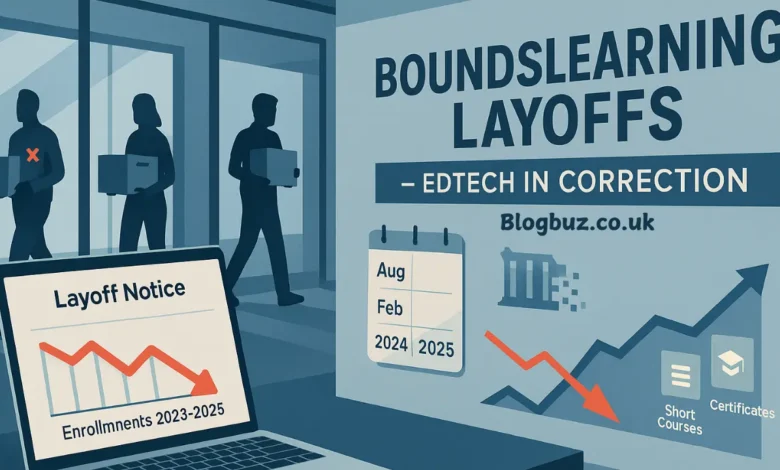Boundless Learning Layoffs: Causes, Impact, and Lessons for the Future of EdTech

The Boundless Learning layoffs have become a trending topic in the education technology (EdTech) industry over the past two years. Once seen as a promising rebrand of Pearson Online Learning Services (POLS), Boundless Learning has faced multiple rounds of job cuts since 2023. These layoffs have not only affected hundreds of employees but also raised critical questions about the state of online education, corporate restructuring, and the sustainability of the EdTech business model in a post-pandemic world. In this comprehensive article, we will examine the history of Boundless Learning, including its timeline of layoffs, the reasons behind them, their impact on employees and the industry, and the lessons that other companies can learn from this ongoing case study.
What is Boundless Learning?
Boundless Learning emerged in 2023 following Regent LP’s acquisition of Pearson Online Learning Services (POLS). POLS was responsible for powering online degree programs for universities, but struggled financially as demand for online degrees declined after the pandemic’s peak.
The rebrand to Boundless Learning was meant to symbolize a fresh start. Its mission was to provide technology-driven solutions that supported online degree programs, instructional design, and student services. However, the optimism quickly faded as the company began downsizing its workforce within months of the acquisition.
Boundless Learning Layoffs Timeline
The story of the Boundless Learning layoffs is best comprehended through a timeline of key events.
August 2023 – The First Major Layoff Wave
- Boundless Learning reduced its workforce by approximately 40–50% shortly after its rebrand.
- Employees reported being locked out of systems immediately, with no severance pay provided.
- The layoffs were sudden, creating an atmosphere of distrust and fear among remaining employees.
February 2024 – A Second Round of Cuts
- Another 15% of the workforce was laid off globally.
- This time, some employees received minimal severance packages (e.g., two weeks’ pay per year of service).
- Layoff notifications were often delivered via Zoom, which many considered impersonal and insensitive.
2025 – Continued Reductions and Uncertainty
- Reports suggest another 30–50% reduction in staff occurred in 2025.
- Despite some severance and temporary benefits being offered, employees continued to express dissatisfaction.
- Ongoing restructuring has left the company’s future direction unclear.
This cycle of repeated layoffs highlights a deeper structural issue rather than a short-term adjustment.
Why Did the Boundless Learning Layoffs Happen?
Several factors contributed to the Boundless Learning layoffs:
Declining Demand for Online Degrees
During the COVID-19 pandemic, demand for online programs surged. However, by 2022–2023, enrollment numbers began to drop as students returned to in-person learning. This sharp decline put financial pressure on Boundless Learning’s business model.
Competition from Alternative EdTech Platforms
Boundless Learning faced intense competition from online learning platforms such as Coursera, Udemy, and edX, which offer flexible, affordable, and often shorter credentialing options. Universities that partner with Boundless Learning struggle to compete with these more accessible alternatives.
Rising Operational Costs
Running full-scale online degree programs requires significant investments in technology, marketing, and student support. As costs increased and revenue fell, Boundless Learning was forced to make cuts.
Strategic Mismanagement
Critics argue that Regent LP and Boundless Learning failed to create a clear, long-term strategy for profitability. Layoffs were often executed abruptly, damaging employee morale and trust without addressing deeper structural problems.
Industry-Wide EdTech Correction
Boundless Learning was not alone in facing workforce reductions. Many EdTech companies, which over-expanded during the pandemic boom, were forced to downsize as the industry normalized.
Impact of Boundless Learning Layoffs
The Boundless Learning layoffs have had far-reaching consequences:
On Employees
- Many employees described the layoffs as abrupt and dehumanizing, with their system access being revoked before official notifications were issued.
- The lack of severance or minimal packages left workers financially vulnerable.
- Glassdoor reviews cite a toxic work environment fueled by fear of further layoffs.
On the Company’s Reputation
- Universities and partners lost confidence in Boundless Learning’s ability to deliver stable, long-term services.
- Negative press and employee backlash tarnished the brand’s image just months after its launch.
On the EdTech Industry
- The layoffs served as a cautionary tale about the volatility of the EdTech sector.
- They highlighted the risks of over-expansion and the dangers of relying on short-term enrollment booms.
Employee Voices: Inside the Boundless Learning Layoffs
To fully understand the human side of the Boundless Learning layoffs, it is essential to hear from employees themselves:
- One instructional designer wrote:
- “Mass layoffs with no severance. Rounds upon rounds of layoffs with no warning. Terrible communication from leadership.”
- Another review stated:
- “Since Regent took over, the culture has collapsed. Constant fear of layoffs, broken promises, and zero transparency.”
- A former staff member summarized the experience as:
- “A company built on uncertainty. Every week felt like it could be your last.”
These voices illustrate the emotional and financial toll of corporate decisions when layoffs are handled poorly.
Broader Lessons from the Boundless Learning Layoffs
The case of Boundless Learning layoffs provides essential insights for the future of EdTech and corporate restructuring:
Transparency Matters
Layoffs may sometimes be unavoidable, but the way they are communicated determines whether employees feel respected and valued. Sudden cuts without explanation or severance breed resentment.
Overexpansion is Risky
The pandemic created a temporary surge in demand for EdTech. Companies that scaled too quickly are now paying the price. Sustainable growth should always be prioritized.
Diversification of Services is Crucial
Boundless Learning focused heavily on online degree programs. In contrast, competitors like Coursera diversified into short courses, certificates, and corporate training—creating more resilience.
Employee Well-Being Affects Reputation
Poorly handled layoffs can damage a brand’s reputation far beyond the immediate workforce. Future talent, university partners, and students may all think twice before engaging with a company known for instability.
Adaptability is Key
The EdTech landscape is constantly evolving. Companies must adapt not only to technological advances but also to changing student preferences and global market conditions.
What’s Next for Boundless Learning?
The future of Boundless Learning remains uncertain. While the company continues to operate, repeated layoffs suggest ongoing financial instability and strategic confusion. To survive, Boundless Learning may need to:
- Reassess its business model and diversify offerings beyond online degree partnerships.
- Rebuild trust with employees and partners by committing to transparency and fair treatment.
- Innovate strategically by tapping into growing markets such as corporate upskilling or AI-driven education.
Whether Boundless Learning can recover from the reputational damage caused by its layoffs will depend on its ability to adapt and learn from past mistakes.
Conclusion
The Boundless Learning layoffs are a cautionary tale for both employees and companies in the EdTech industry. From abrupt terminations without severance in 2023 to ongoing reductions in 2024 and 2025, the layoffs underscore the risks associated with poor management, declining demand, and an over-reliance on outdated business models.
You May Also Read: The Future of Online Coding Education – Inside ProgramGeeks .net




